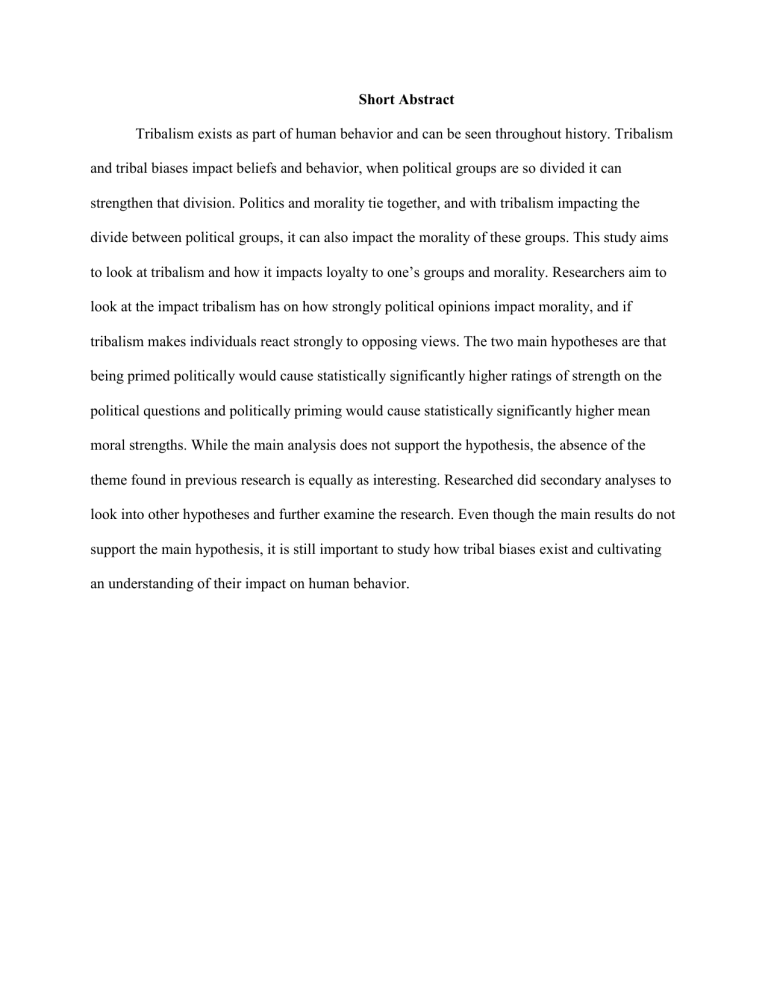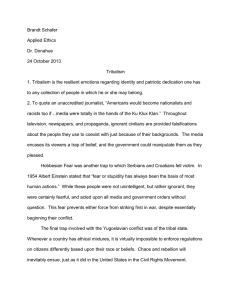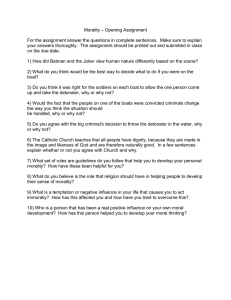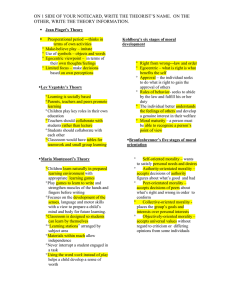
Short Abstract Tribalism exists as part of human behavior and can be seen throughout history. Tribalism and tribal biases impact beliefs and behavior, when political groups are so divided it can strengthen that division. Politics and morality tie together, and with tribalism impacting the divide between political groups, it can also impact the morality of these groups. This study aims to look at tribalism and how it impacts loyalty to one’s groups and morality. Researchers aim to look at the impact tribalism has on how strongly political opinions impact morality, and if tribalism makes individuals react strongly to opposing views. The two main hypotheses are that being primed politically would cause statistically significantly higher ratings of strength on the political questions and politically priming would cause statistically significantly higher mean moral strengths. While the main analysis does not support the hypothesis, the absence of the theme found in previous research is equally as interesting. Researched did secondary analyses to look into other hypotheses and further examine the research. Even though the main results do not support the main hypothesis, it is still important to study how tribal biases exist and cultivating an understanding of their impact on human behavior. Long Abstract Tribalism exists as part of human behavior and can be seen throughout history. Tribalism and tribal biases impact beliefs and behavior, when political groups are so divided it can strengthen that division. Politics and morality tie together, and with tribalism impacting the divide between political groups, it can also impact the morality of these groups. Using past research on tribalism, morality, and politics; the current research aims to focus on the effect tribalism and political beliefs might have on how closely participants view issues as moral issues. Researchers aim to look at the impact tribalism has on how strongly political opinions impact morality, and if tribalism makes individuals react strongly to opposing views. For example, does an individual who identifies as republican view their own beliefs as strongly relating to their moral values because they feel a tribal loyalty or bias towards their own group. An analysis of tribalism and political groups’ effect on morality will show that there are tribal biases in individuals that change how strongly they believe a political issue is part of their moral values. The two main hypotheses are that being primed politically would cause statistically significantly higher ratings of strength on the political questions and politically priming would cause statistically significantly higher mean moral strengths. While the main analysis does not support the hypothesis, the absence of the theme found in previous research is equally as interesting. Reasons such as politics being at the forefront of media attention which could have primed the participants before they were primed by the questions in the survey, and others can explain why the differences were not statistically significant. Regardless of the results, the research can still be used as a stepping stone to continue learning about the interaction between tribalism, morality, and politics. Researchers did secondary analyses to look into other hypotheses and further examine the research. There were some significant results in the secondary analyses of the data, which can also help to further the exploration into the way these three topics interact. The first hypothesis that the secondary analysis looked at was that republicans would vote strongly for their party beliefs and against others, however, there was no statistically significant interaction with the priming condition. This secondary analysis also looked into hypothesis such as participants who identified as republican would have statically significantly higher ratings on the mean moral strength than democrat participants, participants who viewed the priming first and identified as conservative would have a statically significantly higher mean moral strength than those liberals and moderates, and others. The final secondary analysis looked at the priming questions and age of participants, to see if age and priming increased mean moral strength. Even though the main results did not support the main hypothesis, it is still important to continue to study how tribal biases exist in politics and morality, and cultivating an understanding of their impact on human behavior. Learning about these interactions can help in understanding tribal biases in the United States, and help in understanding the different groups and how the divide grows between them.




